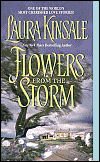
How "real" does fiction have to be? I ask this because I know that a lot of criticism that some readers levy against a novel or short story, or a movie, for that matter, is that such and such didn't or couldn't happen in real life.
Vice versa, some writers justify events or actions taken by their characters by saying "but that's how it really happened."
"How it really happened" is important when writing non-fiction or else the legtimacy of your article or book will be questioned. But how important is it in fiction?
IMHO, fiction is a cauldron whereby what we, as human beings, see, feel, think, experience or dream is thrown into a big, black, boiling pot. We stir that pot, using craft and imagination, and out of it comes something that I like to think transcends fact and reality. Something that speaks to us in ways that facts just can't give us.
An almost indefinable experience of the
truth of the human adventure we call life.
Please note that I used the word
truth, not fact. Not reality. But truth. Truth is not necessarily fact. Truth is something that resonates beyond the coldness and sterility of facts. It vibrates with that which is more than mere fact and becomes transcendent, almost spiritual. Truth is something you know with your soul, not your mind.
So, when I read a piece of fiction, I don't look for facts, I don't look for reality. I look for the truth of the experience of that novel, short story or movie. Each will have it's own truth.
If they're done well, of course.
Some fiction may be steeped in carefully researched facts. The writer may have duplicated whatever she really experienced down to the colors of the buttons on the protagonist's shirt, but that story still may lack truth.
And I should say that so called serious or literary fiction is not the only source of this truth of which I speak. In spite of the fact that genre fiction is still looked down upon by some academics and by those who think of themselves as members of the literary patrician class, it too can have it's own truth.
What some call formulas in romance, mysteries, horror, science ficiton, etc., are actually codes or tropes whereby each reader of said genre can know that this particular writer is well versed in the particular language of that genre.
Now, I'm not advocating that writers of genre fiction rely merely on formulas when writing. Heaven forbid!
But when a new writer is advised to read well within whatever genre she is interested in writing in, part of the reason for that advice is in order for the writer to familiarize herself with these codes and tropes. Not only so that she can avoid doing what's been done to death, but so that she can speak in the language that a reader of a mystery novel will expect, for example. And that language will be different, in some respects, from the language of a romance novel.
But back to fact vs. fiction. If I'm reading a historical novel, I don't necessarily want to come across some egregious and glaring mistake. But I'm not looking for 100% accuracy either. If I want that I'll read a non-fiction book on that historical period. And even then I know what is written in the non-fiction book won't be 100% accurate either.
No opinion can be trusted; even the facts may be nothing but a printer's error.W. C. Williams
When I'm reading a romance or a mystery, fantasy or science fiction, horror or a western, all I ask is that the writer remain true to the rules of the world he has established within his fictional milieu.
Waiters who are giraffes? No problem. Just make me believe it and, then, don't violate my belief over the course of the story.
So I'm not big on facts or reality in the ficiton I read. But I am big on truth.
If you're interested, the link below will take you to a website where tropes from television, comic books and videogames are being collected. It's pretty interesting.
http://tvtropes.org/pmwiki/Labels: Narrative






 I have a few books on my "keeper shelf". Books that once I've read them I have to keep close so that at some future point in time I can read them again and again and again.
I have a few books on my "keeper shelf". Books that once I've read them I have to keep close so that at some future point in time I can read them again and again and again. Monday night I got a chance to see a free midnight test screening of the movie 300 on our local IMAX theater. Wound up not getting home until 3:00 a.m. and then getting up to go to work at 6:00 a.m. But that's okay.
Monday night I got a chance to see a free midnight test screening of the movie 300 on our local IMAX theater. Wound up not getting home until 3:00 a.m. and then getting up to go to work at 6:00 a.m. But that's okay. I wrote my first ever historical western back in November. It was a short story and I submitted it to the editors who bought my story, "The Cowboy and the Schoolmarm", which was published last year in the The MILF Anthology
I wrote my first ever historical western back in November. It was a short story and I submitted it to the editors who bought my story, "The Cowboy and the Schoolmarm", which was published last year in the The MILF Anthology